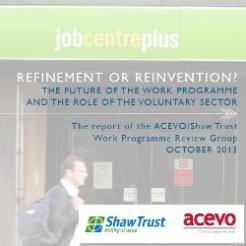Acevo and the Shaw Trust have called on the Department for Work and Pensions to “refine” rather than “reinvent” the Work Programme in a new report, as NCVO warns in a wider analysis of payment-by-results schemes that implementation so far has often been “seriously flawed”.
The report Refinement or Reinvention? The future of the Work Programme, published today by Acevo and the Shaw Trust, concludes that: “The Work Programme needs refinement not reinvention, in order to strengthen outcomes and support the voluntary sector to play more of a leading role.”
It makes three key recommendations:
- DWP should move to a needs-based assessment of individuals to categorise clients rather than continuing to use the benefit-based client categorisation system which the report says is “flawed and does not accurately reflect the costs involved in supporting different clients”.
- DWP should do a review of its supply chain stewardship, including whether the Merlin Standard is sufficient to hold prime contractors to their commitment.
- DWP should look at the possibility of moving towards a “cohort-based” funding model, where providers are rewarded for the proportion of clients they have helped into work, to replace the per-person outcomes-based model for payments as a way to mitigate the level of financial risk incurred by providers.
Sir Stephen Bubb, chief executive of Acevo, said: “Unless charities are fully involved in the Work Programme it will never fulfil its full potential to tackle long-term unemployment.
"It’s clear there have been difficulties in successfully delivering the rhetoric of the scheme. We need all political parties to understand why many charities were excluded from the current Programme and to make the changes we need when the current round of contracts expire."
Implementation of payment by results ‘seriously flawed’
A second report out today from NCVO and Bates Wells Braithwaite looking at the design of payment-by-results contracts and the experience of voluntary sector providers warned that to date their implementation has often been “seriously flawed” and calls for voluntary sector organisations to be more involved in the design of contracts.
Sir Stuart Etherington, chief executive of NCVO, said: “Crudely designed targets and contracts risk pushing expert voluntary sector providers out of public service provision.”
And he added: “Charities have an important role to play in improving public services, but commissioners must work with them in order to design effective contracts.”
The report is based on an analysis of a sample of contracts and interviews with organisations delivering them. Its findings include:
- Targets were irrelevant to, or detrimental to, the desired outcomes
- Providers could be penalised for circumstances outside of their control – they did not account for the complex nature of services
- Some contracts were based on previous contracts for other work and contained unnecessary clauses that could prevent innovation, and
- There is a gap between on-the-ground experience and what is reported back up the supply chain.
Report author David Hunter, who is a lawyer at BWB, said: “As PbR proliferates as a payment mechanism, it’s crucial that commissioners seek input from providers and service users on realistic targets and contractual terms at the very start of the process.”









